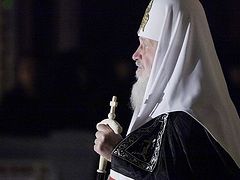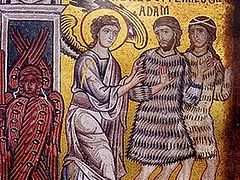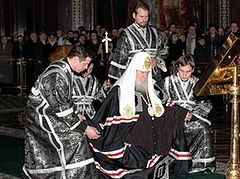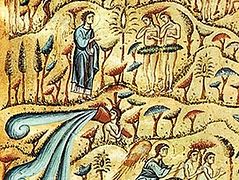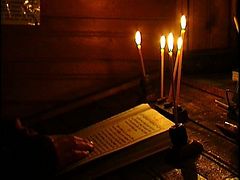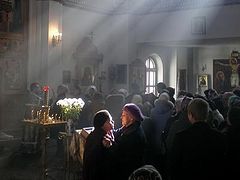Introduction
The Sunday of Forgiveness is the last Sunday prior to the commencement of Great Lent. During the pre-Lenten period, the services of the Church include hymns from the Triodion, a liturgical book that contains the services from the Sunday of the Publican and the Pharisee, the tenth before Pascha (Easter), through Great and Holy Saturday. On the Sunday of Forgiveness focus is placed on the exile of Adam and Eve from the Garden of Eden, an event that shows us how far we have fallen in sin and separated ourselves from God. At the onset of Great Lent and a period of intense fasting, this Sunday reminds us of our need for God’s forgiveness and guides our hearts, minds, and spiritual efforts on returning to Him in repentance.
Biblical Story
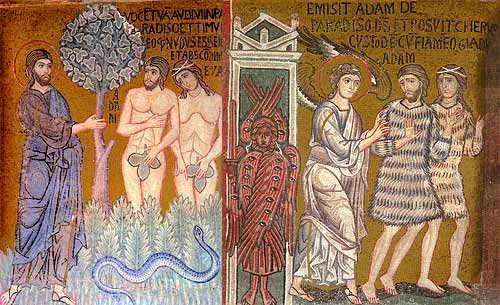 The Lord Confronts the Disobedience of Adam & Eve; "The Expulsion from Paradise", Nave Mosaics from Palatine Chapel, Palermo, Sicily. Mid 12th Century.
The Lord Confronts the Disobedience of Adam & Eve; "The Expulsion from Paradise", Nave Mosaics from Palatine Chapel, Palermo, Sicily. Mid 12th Century.
The Sunday of Forgiveness, the last of the preparatory Sundays before Great Lent, has two themes: it commemorates Adam’s expulsion from Paradise, and it accentuates our need for forgiveness. There are obvious reasons why these two things should be brought to our attention as we stand on the threshold of Great Lent. One of the primary images in the Triodion is that of the return to Paradise. Lent is a time when we weep with Adam and Eve before the closed gate of Eden, repenting with them for the sins that have deprived us of our free communion with God. But Lent is also a time when we are preparing to celebrate the saving event of Christ’s death and rising, which has reopened Paradise to us once more (Luke 23:43). So sorrow for our exile in sin is tempered by hope of our re-entry into Paradise.
The second theme, that of forgiveness, is emphasized in the Gospel reading for this Sunday (Matthew 6:14-21) and in the special ceremony of mutual forgiveness at the end of the Vespers on Sunday evening. Before we enter the Lenten fast, we are reminded that there can be no true fast, no genuine repentance, no reconciliation with God, unless we are at the same time reconciled with one another. A fast without mutual love is the fast of demons. We do not travel the road of Lent as isolated individuals but as members of a family. Our asceticism and fasting should not separate us from others, but should link us to them with ever-stronger bonds.
The Sunday of Forgiveness also directs us to see that Great Lent is a journey of liberation from our enslavement to sin. The Gospel lesson sets the conditions for this liberation. The first one is fasting—the refusal to accept the desires and urges of our fallen nature as normal, the effort to free ourselves from the dictatorship of the flesh and matter over the spirit. To be effective, however, our fast must not be hypocritical, a “showing off.” We must “appear not unto men to fast but to our Father who is in secret” (vv. 16-18).
The second condition is forgiveness—“If you forgive men their trespasses, your Heavenly Father will also forgive you” (vv. 14-15). The triumph of sin, the main sign of its rule over the world, is division, opposition, separation, hatred. Therefore, the first break through this fortress of sin is forgiveness—the return to unity, solidarity, love. To forgive is to put between me and my “enemy” the radiant forgiveness of God Himself. To forgive is to reject the hopeless “dead-ends” of human relations and to refer them to Christ. Forgiveness is truly a “breakthrough” of the Kingdom into this sinful and fallen world.
Icon of the Feast
The icon of the Sunday of the Last Judgment incorporates all of the elements of the parable from Matthew 25:31-46. Christ sits on the throne and before him the Last Judgment takes place. He is extending his hands in blessing upon the Theotokos on his right, and John the Baptist on his left. Seated on smaller thrones are the Apostles, represented by Peter and Paul, a depiction of the words of Christ in Matthew 19:28. (1.)
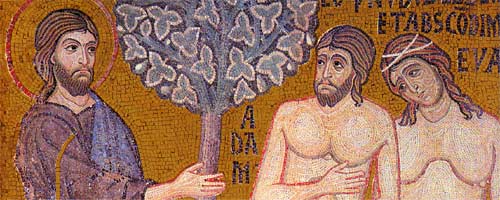 1. Ashamed for the sin that they committed by eating the fruit from the tree of the knowlege of good and evil, Adam and Eve now stand before Christ
1. Ashamed for the sin that they committed by eating the fruit from the tree of the knowlege of good and evil, Adam and Eve now stand before Christ
 2. Adam and Eve were tempted to sin by the devil who appeared to them as a serpent.
2. Adam and Eve were tempted to sin by the devil who appeared to them as a serpent.
|
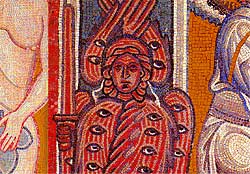 3. A cherubim with a flaming sword was appointed by God to guard the gate of Eden and the way to the tree of life.
3. A cherubim with a flaming sword was appointed by God to guard the gate of Eden and the way to the tree of life.
|
When they took of the fruit and sinned, they realized that they were naked. Further, when “they heard the sound of the Lord God walking in the garden”…they hid themselves “from the presence of the Lord” (3:8). The icon shows Adam and Eve attempting to cover themselves with fig leaves as they try to hide, and yet they stand ashamed before the Lord.
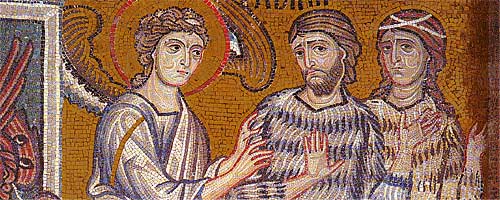 4. For their disobedience, the Lord has Adam and Eve expelled from Paradise. They leave dressed in garments prepared by God.
4. For their disobedience, the Lord has Adam and Eve expelled from Paradise. They leave dressed in garments prepared by God.

